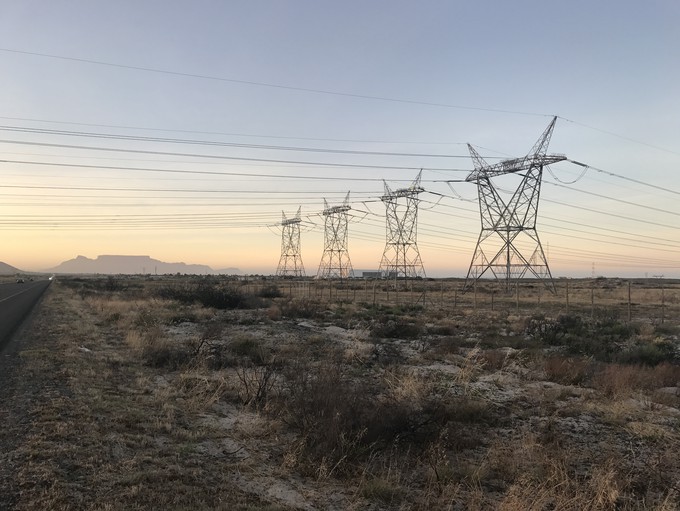
Electricity pylons at Koeberg nuclear power plant. Photo: Brent Meersman
9 February 2017
Earthlife Africa and Southern African Faith Communities’ Environment Institute (SAFCEI) will be back in court on 22 February to challenge the controversial nuclear deal between Russia and South Africa.
The case challenges a decision by Minister of Energy Tina Joemat-Pettersson to have her department acquire nuclear power to generate 9,600 MW of electricity. This kind of decision by a minister to procure something is called a determination.
The case was postponed on 14 December 2016, after Joemat-Pettersson threw a spanner in the works by presenting a new energy determination minutes before court began, which appeared to override the determination Earthlife was challenging in the court.
Earthlife requested a postponement to file additional arguments to address the new determination. The judge granted the postponement and also made a costs order against the Minister for ambushing Earthlife with the new determination.
Following the postponement, the Minister filed an affidavit providing Earthlife with the record of the decision. The record of the decision is the collection of documents that were used to make the decision including emails and minutes of meetings. The record must be provided if the decision is being challenged in court. Evidence from the record is usually used to prove a decision was not taken correctly.
The Minister’s affidavit says the new determination was made to amend the previous one. The old determination stated that the Department of Energy would procure the power and then sell it to Eskom. The new determination allows Eskom to procure the power directly. Eskom has decided not to oppose the court challenge.
The Minister countered the allegation that the late presentation in court of the new determination was intended to derail Earthlife’s case.
Although the determination was signed on 5 December, the Minister only published it on 14 December, the day the case was in court. According to the papers, the Minister had to wait for the National Energy Regulator of South Africa (NERSA) to formally agree before publishing. NERSA only informed her of their agreement on 12 December.
Most importantly for Earthlife’s case, however, is that the Minister’s affidavit confirms that there was no public participation process conducted before the determination was signed.
In its new affidavit Earthlife repeats its argument that the minister should have gone through a public participation process before taking the decision. Earthlife also argues that NERSA must actually decide whether the determination is correct rather than just ‘rubber-stamping’ it.
Earthlife also argues that the new determination does not actually amend or repeal the previous ones, despite what the minister has said. The result is two conflicting determinations which give different institutions the power to procure nuclear power.
Though Earthlife’s case is a complex one, the real question the court will need to answer is simple: can the minister make a decision that will cost the country almost R1 trillion without consulting anyone?
The matter will be heard from 22 to 24 February in the Western Cape High Court.
See also: Understanding the court challenge to the nuclear deal